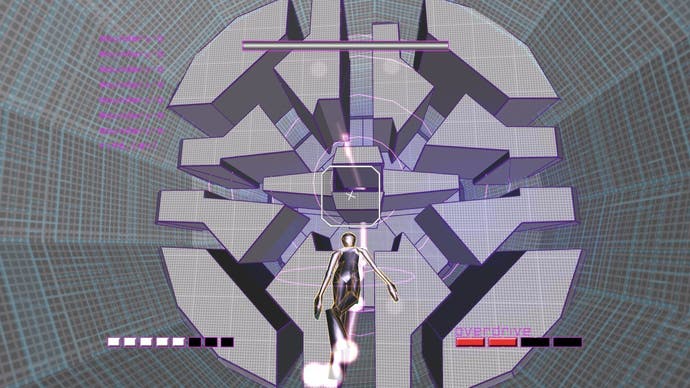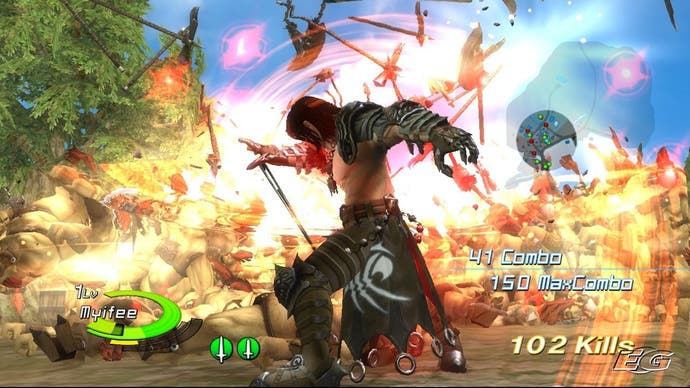Q Entertainment's Tetsuya Mizuguchi
Remakes, revolutions and the future of media.
Both. People always want new experiences - and technology always gives us those new experiences. For example, high-def technology, interactive technology, high quality sound technology, compression technology - everything working together to make new experiences. Technology even gives us new ways to touch people's emotions, to move them with new sensations.
I'd like to think that human desire is always walking ahead of technology. I hope so, anyway. I think that every product - including games, entertainment, every piece of content or media - is always designed by human desire. Whether it's invisible or visible, with shape or with no shape... Artificial products, created by human beings, are always designed by our desire and our basic instincts. If we don't feel like, "I want to do this" or "I need this" - if there's no trigger like that, then people won't bother. They'll pass it by and say, I don't care about that - this isn't what I'm interested in. It's a really simple point, but all things, all products, are like that.
So let's talk about games, about interactivity. These things have no shape, and they're invisible products - not like, say, a statue. This is data, a high-pressure package of data - a lot of different art, and sound, and interaction, all packaged together. It includes an emotional side and a physical side. It's physical in terms of the good or bad feeling that you get from the timing, the controls, the constant call-and-response, call-and-response. But in the process of that call and response, you watch and you hear, and you get some stimulation - you think, and you feel, even feeling some emotional things. This is the chemistry, the physical and emotional side.
Interactive is a new area, but it's such a wide canvas - and in three dimensions, not 2D! It's very difficult to design things interactively, much more difficult than it is to create a movie or a TV show.

It depends on the project, and it depends on the artist. With Rez, or the first Lumines... With those games, the sound has a very important role. Sound has a power. Sound controls your emotions. When you hear sound, moving with the visuals, it influences you - it's one of the important tools in the game design process, the level design process. Sounds can give you direct feedback, telling you if you're succeeding or failing, making you feel good or bad about the experience. If I want to use sound effects, and the power of sounds, as part of the level design, in that case I'll always explain that directly to the artist. I'll say, "please make these sounds to fit that", or, "I need this kind of feeling from the sound". For a lot of requests, I do that.
In Lumines 2, we used music tracks behind the game. In that case, I simply said, "please make very good music" - taking a wider point of view, and asking them to make good music just as music.
With sound, with music - there are so many worlds. In the process of making music, there's a reason behind it... Some music you want to sing. Some music you want to dance. Some music helps your emotional involvement in movies. And now, some music exists for games, for the interactive process, and this is totally different. When I meet artists for the first time, I try to explain about that - saying, "you've made many types of music, for many different reasons, but interactive game music is another different type of world".
Some artists, yeah, they respond very well - but some artists... Some artists just don't know at all about games. Recently, though, everybody is changing. I think the old people in the industry are moving out, new people are coming in - new people who grew up with videogames.

Yeah. It's easy for them to understand, easy to communicate with them. They understand the visual experience.
My big interest is in making new experiences, a new category... Well, not a new category, but a new experience, definitely. I studied media aesthetics at university, and it's given me a big passion to create new sensual and emotional experiences.
With Ninety-Nine Nights, we tried to combine the movie and game experiences, taking the next step with that. At the time, I spent my time trying to create interactive, multi-process storylines. And yeah, that was fun - that was a great experience. I'm still keeping that kind of idea, actually. Now, I'm concentrating on music interactive products - but in the future, maybe I will try that kind of project again.
Maybe, yes.... Well, in public! [Laughs]
I love writing. My major was in writing, actually. Now I'm writing lyrics for Genki Rockets, the music group.
